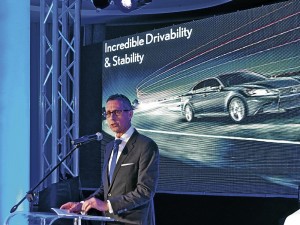
LEXUS Asia Pacific head Paul Carroll at the launch of the all-new Lexus ES350. Photo by Tessa R. Salazar
Hot on the gas pedal, and fast on the tongue. That’s how many foreigners seem to describe Filipino drivers and their street-smart ways. The latest visitor to concur with this observation has been Lexus Asia Pacific head Paul Carroll, who was in Manila July 25 for the launch of the all-new Lexus ES350.
When asked by Inquirer Motoring what he thought of drivers in Manila, Carroll said: “Their (command of the) English (language) is so good, it’s easy to communicate here. They are pushy drivers, too. Directional gauges are used, but drivers are quite aggressive.”
It was Carroll’s second time in Manila, but his observation, he said, has been the same for both visits. Other notable foreigners had similar thoughts on the Pinoy way of driving as soon as they left the airport and exposed themselves to the streets.
When popular Formula 1 driver Jenson Button visited Manila a few years ago, after being driven around the city to the different venues he was scheduled to appear in, he remarked that he could never have the courage to drive in this city. “I can see lots of Formula 1 driving out here,” he quipped then.
Herbert Grunsteidl, a German BMW AG-certified product trainer who was interviewed by the Inquirer a few years back (“City driving dumbs down drivers, BMW trainer”), was awed at how jeepney drivers could weave through traffic while getting passengers’ fares and even calculating the change to be handed back, all the while operating jeepneys that obviously were running on crude parts.
Another German, globetrotting 73-year-old Gunther Holtorf, who had been driving his 1988 Mercedes-Benz 300 GD around the world since 1989, told this author that, despite already being exposed to so many strange rides across the planet, some Philippine transport practices still caught him off-guard or cringing, like motorbikes carrying six people, tricycles loaded with up to 15 elementary students, and jeepneys stacked with up to 40 passengers, most of them on the roof. Some drivers even have the confidence to send out text messages on their mobile phones.
“Signboards calling for ‘don’t text and drive’ may only be seen in the Philippines. It appears that half of the population is always texting the other half,” Holtorf exclaimed.
“Interestingly, Filipino (drivers) do actually give way. They do let people through, but the space they leave for you to go through is so minimal. The cars are much closer to each other,” Carroll said.
He compared Pinoy drivers to those in other countries. “Filipino drivers have similar skills to drivers in Rome and Paris. I’m not saying they’re better, but (this type of driving) is not stupid driving. Filipinos are very calculating behind the wheel.”
He added, “I think you have so many cars on the road. If you weren’t pushy, you probably would just be forced to sit and wait. You might not get anywhere!”
In an interview a few years back, Dr. Jose Regin Regidor, director of the UP National Center for Transportation Studies, puts the Filipino behavior on driving largely on impatience. Combined with the “Filipino time” attitude of acting only at the last minute, this forces drivers—both public and private—to resort to overly aggressive driving.
Mandy Eduque, Automobile Association Philippines motorsports committee chairman, quoted an Australian traffic consultant of a DPWH project several years ago who said that for Filipino drivers, traffic lights were merely “a suggestion.”
But then again, ES350 owners need not worry themselves about being pushy on the road. Let their drivers handle that. Carroll disclosed that, according to market studies, ES owners prefer to be chauffeur-driven on weekdays, but on weekends, or during golf play days, owners themselves would most likely be behind the wheels.